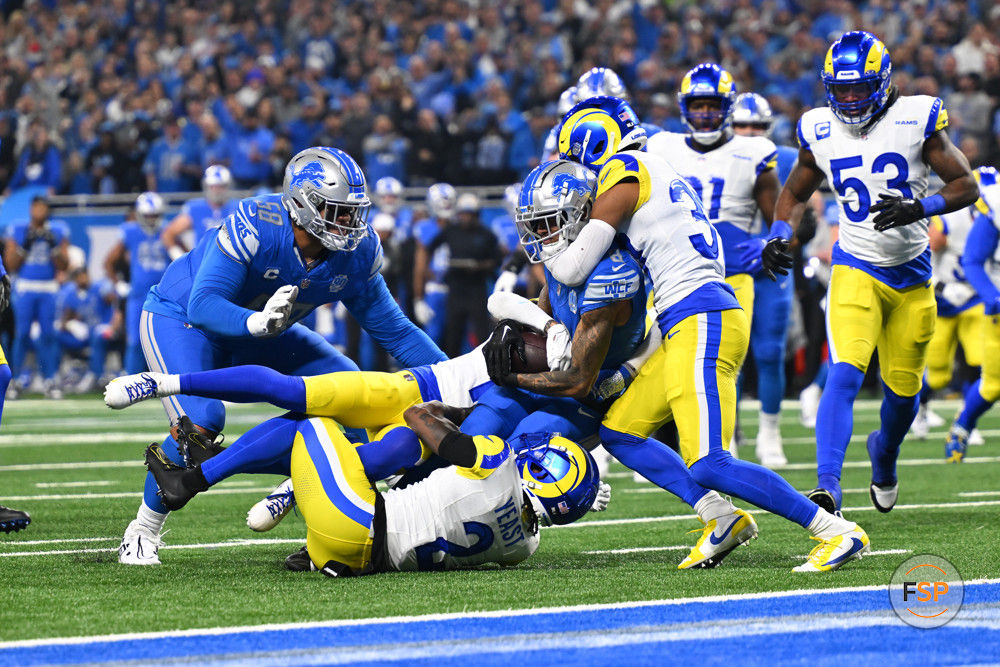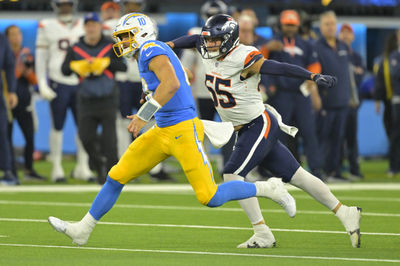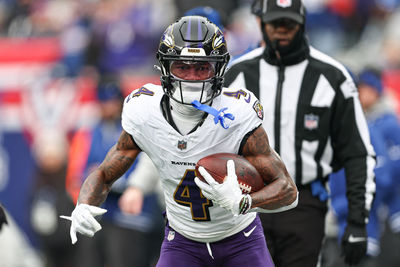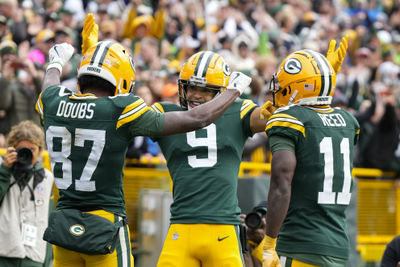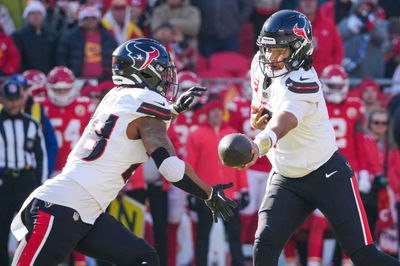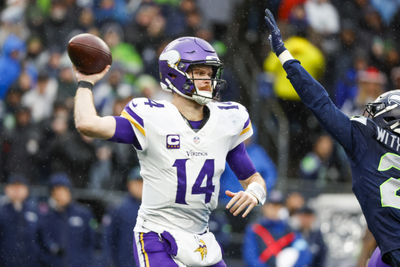Things Announcers Say: The Untrue Axioms of Football
There are sayings in football that are held true, even against all evidence. Here are three that stand out, with a few that have been contradicted already this playoff season.
Do you ever get annoyed by the things people say? If you’re like me, it’s a daily occurrence (maybe hourly). In this case, however, I’m talking about the things they say regarding sports.
Announcers on national broadcasts say the same things over and over about every team as if no one is different: “You have to run the ball to win the game;” “They have momentum;” “He knows how to win/is a winner.”
They’re all statements that mean nothing or, at best, are flawed in their reasoning. These old axioms can be true over a sample, and maybe they were more accurate in a previous generation, but talking heads use these phrases as cover-alls rather than giving real analysis of the game.
I wanted to dig into three of my least favorite axioms about sports (and in this case, specific to football) and how they have been proven wrong despite their continued use. We have already had evidence against the first two after just four playoff games.
Defense Wins Championships
Examples: Houston Texans over Cleveland Browns 45-14; Green Bay Packers over Dallas Cowboys 48-32
Defense-adjusted Value Over Average (DVOA) is a stat you will hear quoted a lot by football people because it gives a more accurate portrayal of a player’s or team’s performance than raw numbers. DVOA is based on the situation, the opponent, and other factors, and it measures success on a play-by-play basis.
It’s not perfect, but DVOA might be the best measure we have right now. By defensive DVOA, the Browns were the second-best defensive teams in the league this season and the Cowboys fifth. If defense wins championships, these two would be up there with Baltimore and San Francisco as likely to win it all.
Instead, they both gave up over 40 points and were upset in the Wild Card Round. The Cowboys, in particular, couldn’t stop the Green Bay attack and were regularly torn apart. For what it’s worth, the Packers are sixth in offensive DVOA and the Texans 14th.
We’ve seen this axiom debunked throughout most of this century. As offenses get more creative, defenses are usually trying to survive, not win the game single-handedly. The Seahawks won in 2014 behind the Legion of Boom; Denver won two years later with the league’s best defense and a compromised Peyton Manning.
Most other Super Bowl champions over the last 20 years were either relying on their offense or had a balanced team without a dominant defense. Both recent Chiefs’ championships, the Rams two years ago, the Tom Brady Bucs, these teams were as reliant on the offense as a lockdown defense.
So, does offense win championships? No, that’s not the answer either. The best overall teams win championships. Every team that wins has superstars, whether that’s a top-level QB or defensive stars like Ray Lewis and Warren Sapp. Great teams win championships.
What Does It Mean This Year?
Of the teams left, the Ravens, 49ers, and Chiefs had top-10 defenses by DVOA. Each team is a contender, but it’s because of their offensive prowess as much as the defense. We aren’t getting a champion this year like the Ravens or Bucs at the beginning of the century who took Trent Dilfer and Brad Johnson, respectively, to Super Bowl trophies.
This year’s champion will not be crowned because of their defense, but instead by the caliber and execution of the entire team.
They’re Too Young/Have to Learn to Win
Examples: Houston Texans over Cleveland Browns 45-15; Green Bay Packers over Dallas Cowboys 48-32
This one drives me up the wall. If you were a middling athlete in high school (like me!), you saw younger kids come in and get more varsity playing time. The best freshmen become immediate focal points when they come of age.
That’s the reality of the world, especially in sports. A guy nearing 30 years old is on the decline and not worth a big contract, right Mike Evans? A mix of young talent and veterans is the best way to sustain a winner.
I didn’t mean for it to fall this way, but the two games we focused on in the last section are relevant again here.
Dak Prescott had his best season and is a top-five MVP candidate; Jordan Love got his first extended playing time after three years on the bench. Every Green Bay pass catcher is in his first or second season; Brandin Cooks has gained 1,000 yards with four different teams, and CeeDee Lamb is making a case for best receiver in the league.
Who won that game? Was it the grizzled vets near the top of the conference, or was it the young upstarts who have been running through the league lately? The same situation played out in Houston.
This was the ultimate matchup of young vs old: Rookie sensation C.J. Stroud against former Super Bowl MVP and 38-year-old Joe Flacco. Kevin Stefanski hasn’t been at it for a real long time, but his counterpart on the other sideline, DeMeco Ryans, is a rookie coach who was in his first playoff game.
None of it mattered. Flacco threw pick-sixes on back-to-back possessions, and the Texans never stopped piling on. The young teams didn’t just win, they roundly outplayed their more experienced competition.
What Does It Mean This Year?
Two young teams have already advanced, so watch out. In reality, the likeliest teams to win are veteran crews in San Francisco, Baltimore, and the like, but each of those teams has multiple young contributors who are paramount to winning. Age won't determine the Super Bowl winner as much as matchups and execution.
One quick related note: I hate the saying “they’re too young to know better.” As in, a young team can come in and win a playoff game because they don’t know how big the moment is. Shut the **** up. High school playoff games have way more intensity than the regular season; these guys know what it means to play for the chance at a Super Bowl. Everyone knows better.
It’s Hard to Beat a Team Three Times in One Season
This one won’t come into play this season, but it’s one of my biggest pet peeves. To start, there is plenty of evidence that Team A is MORE likely to beat Team B a third time if they’ve already beat them twice. Better teams win more; that’s the bottom line.
If two teams are equal, it’s likely that three games will end up 2-1 in favor of one side. That doesn’t mean the third game is more likely to go toward the 0-2 team just because they lost twice, though.
The gambler’s fallacy is a belief that something is more likely to happen because it hasn’t in a while, that old saying that someone is “due” for a big game. If the roulette ball landed on red five times in a row, it has to come up black next time, right?
The odds don’t change based on previous outcomes. Football is a little different because it involves humans and moving parts, but the better team is going to win most of the time. Last year, the 49ers beat the Seahawks 27-7 and 21-13 during the regular season. I remember the chatter about Seattle having an advantage when they played in the Wild Card round because they had already lost twice to this team.
Just imagine it in other terms: Your 10-year-old daughter missed two consecutive 3-pointers from NBA range, so she’s due to make one soon! That’s an extreme example, but the thinking is related. San Fran was much better than Seattle, and they beat the Seahawks a third time in the playoffs 41-23.
What Does It Mean?
There’s no big epiphany or takeaway here. The lesson is that just because something is said over and over doesn’t make it true. Things change, and the people who come up with sayings aren’t always as smart or perfect as we like to think.
Remember this when you gamble or play fantasy football because it will come up again. Someone next season will say they like a guy because “he just knows how to play.” How can you draw an opinion off that? Rely on numbers and past performance to predict what is likely to happen in the future, not the ramblings of Stephen A. Smith.
































